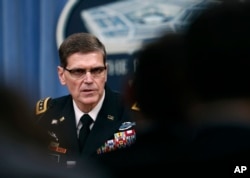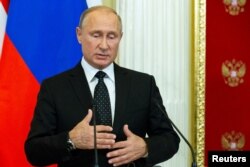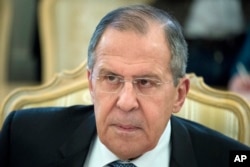Russia continues to compete for influence in Afghanistan, where international reconciliation efforts are underway, while Iran is playing both sides of the Afghan conflict, according to a top U.S. military official.
The head of U.S. Central Command, Army Gen. Joseph Votel, told VOA that Moscow was posturing to be a "player in the solution" to the decades-long conflict.
"I think what they [Russia] are doing trying to do is they are pursuing a strategy which is to compete with us by trying to exert their influence wherever they can, whether it is in Afghanistan or Syria or anywhere else," Votel said.
"They are continuing to use disinformation to create the narrative that they want," the CENTCOM commander noted. "They continue to perpetuate this idea, not just in Afghanistan, but in Iraq and Syria as well, that the United States is responsible for supporting and propagating ISIS."
Votel said the notion that the United States was somehow promoting the Islamic State terror group, also referred to as ISIS, was "ridiculous."
Russia's spoiler role
Matt Dearing, an assistant professor at the Washington-based National Defense University, said Moscow's involvement in Afghanistan comes as no surprise.
"They have every incentive to play spoiler in Afghanistan. I expect they will continue to do so on multiple fronts, whether it is engaging Taliban or supporting government opposition parties," Dearing said.
"It is unfortunate when political figures in Afghanistan accept Russian support, as this creates further divisions in politics and weakens the legitimacy of GIROA [Government of the Islamic Republic of Afghanistan]," he added.
Thomas Johnson, a professor at the Naval Postgraduate School in Monterey, California, and author of Taliban Narratives, said that while Russia is trying to assert influence in Afghanistan, its role is somewhat exaggerated.
"I think the notion that they [Russian officials] play a role on [the] Taliban is overblown," Johnson said, adding that Afghans, including the Taliban, have a vivid memory of Russian intervention in late 1970s and that "Afghans dislike Russians."
Johnson, who has spent time in Afghanistan, said Russian President Vladimir Putin ultimately wants to see the U.S. fail in the war-torn country.
"I think Putin has a global view. I think that he is playing chess. I think he is trying to ensure that the United States does not achieve any of its goals in Afghanistan," he said.
Omar Samad, a Washington-based former Afghan ambassador, said new regional fronts and alliances have taken shape in recent years, undermining regional and international consensus that once existed on the goal of counterterrorism.
"The issue of Afghanistan, until two to three years ago, was a relatively black-and-white issue, where you had the international community, including countries like Russia and Iran, backing the Afghan government and standing united against terrorism," Samad told VOA's Afghan service.
"Now countries have created new alliances, and peace talks in Afghanistan mean different things to different countries," he said. "The definition of friends and foes has changed."
Russian contacts with Taliban
Moscow does not deny its contacts with the Afghan Taliban, but Russian officials assert the country is in touch with the insurgents to encourage them to engage in peace talks.
"We maintain these contacts primarily for the sake of the security of Russian nationals in Afghanistan, Russian agencies there, and also to convince the Taliban to renounce armed conflict and join the national dialogue with the government," Russian Foreign Minister Sergey Lavrov said in August, after the Afghan government voiced concerns about the issue.
Lavrov rejected Afghan assertions that Moscow's ties with the insurgents were aimed at using the Taliban to fight Islamic State militants.
"I cannot imagine how Russia even hypothetically could use the Taliban against ISIS," he said, using an acronym for Islamic State. "We are fighting ISIS with every tool we have. We support Syria in this fight and provide assistance in equipping the Iraqi army for the same purpose. Of course, we want the Afghan people to get rid of ISIS."
Earlier this year, Moscow planned a regional conference in Moscow for September and invited representatives from 11 regional countries, including China, Pakistan and Iran.
Afghan officials expressed concern about the conference, fearing it would undermine the country's long-held stance of leading and owning the peace talks with the Taliban.
A phone call between Lavrov and Afghan President Ashraf Ghani led to both sides postponing the meeting.
Iran's role in Afghanistan
Russia is not the only nation seeking influence in Afghanistan. CENTCOM's Votel said the Iranians have "hedged their bets" in Afghanistan, by trying to have relationships with both the Afghan government and the Taliban.
He said that unlike Russia, Iran is more concerned about its own stability.
"They [Iranian leaders] don't have any, obviously, any love for us [the U.S.] here, but I do think Iran shares concerns along their eastern border, the western part of Afghanistan, and is concerned about the threat of this emanating onto them," Votel told VOA on Thursday.
Anthony Cordesman, with the Center for Strategic and International Studies, a Washington research group, said the relationship between the Taliban and Iran was more of a contingency plan.
"They are creating relationships that they hope will make the Taliban safe if it takes over from the Afghan government," Cordesman said earlier this year, following reports of Tehran's involvement in the large-scale attack on Afghanistan's Farah province in May, which borders Iran.
"Another source of speculation is that Iran is supporting the Taliban as a counterbalance to the growing role of ISIS inside Afghanistan," he added.
VOA's Mehdi Jedinia, Khalid Mafton and Ayaz Gul contributed to this report.







